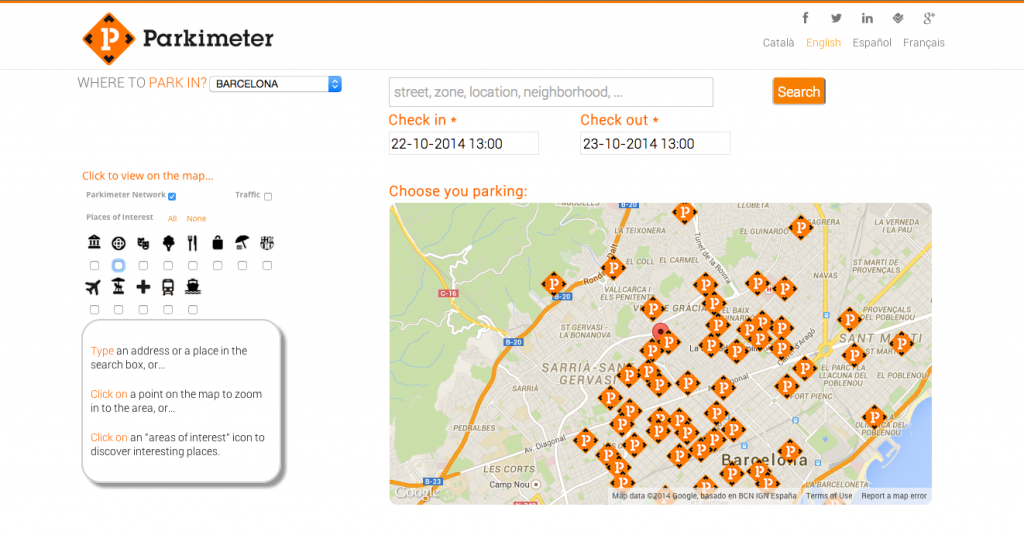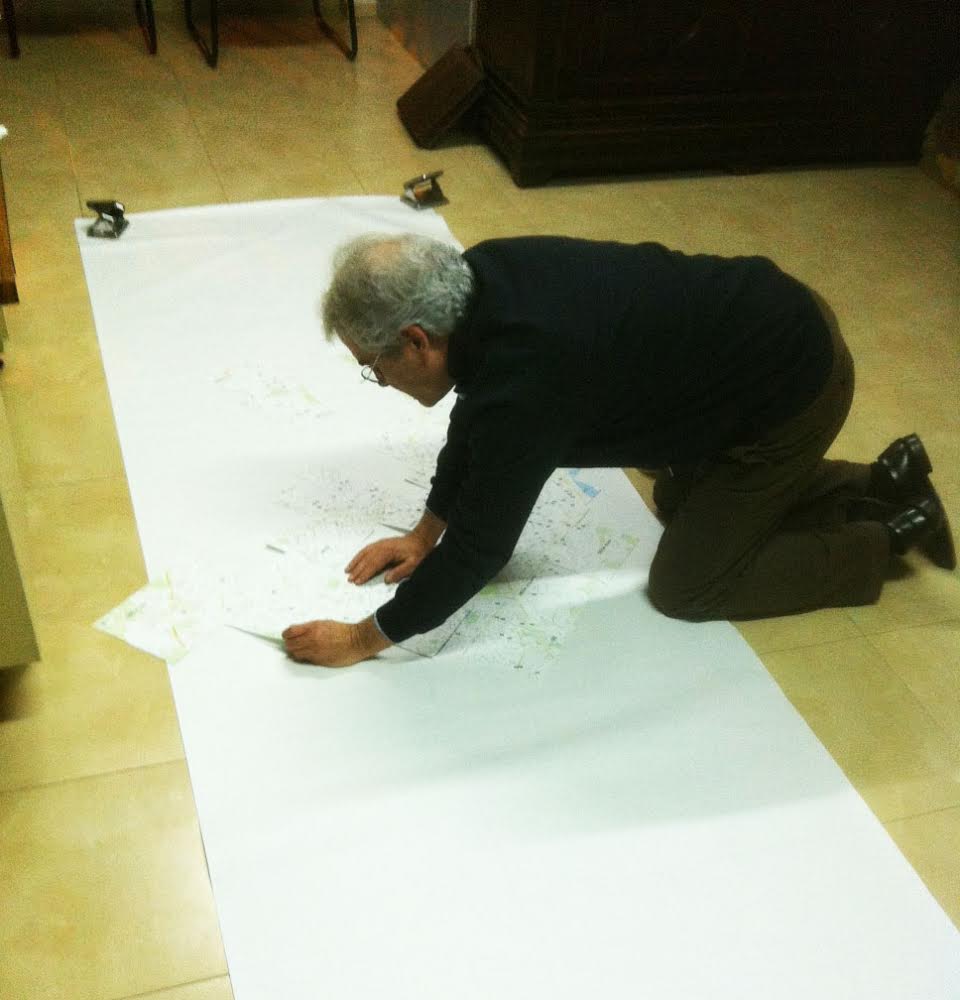The age-old problem of finding a place to park predates the invention of the automobile itself. Even the rough riders of the wild west sometimes had difficulty finding a post to tie up their steeds. “If only there were an app for this,” they must have been thinking. Fast forward a couple hundred years and trying to find parking in a congested urban area is a maddening experience capable of taking years off your life, both in time and in stress.
However, only now in 2014, as we usher in the age of sensors, widespread mobile devices and internet connectivity, do we have the capability to attack the global (lack of) parking epidemic with the speed and efficiency of a truly mobile society.
That’s why we didn’t miss our chance to sit down with the founders of Barcelona startup Parkimeter, Jordi Badal (CEO) and Ferran Gatius (CTO), under a big map of Barcelona covered in Parkimeter stickers hanging on the wall in their Sagrada Família office.
How and when did you make the decision to solve the global (lack of) parking epidemic?
Speaking from personal experience of running a parking garage, a family business tradition, rotation parking (or parking per minutes) is extremely variable. Users are either anonymous or regular subscribers that return often. Parkimeter’s goal is to aggregate the services of several parking services to add value to users, and at the same time save them time and money. With Parkimeter, a user can find where parking spots are available, choose the most convenient parking spot for them, and determine the shortest route there.
We came up with a simple solution to a widespread problem: connect users with parking spaces and payment services using modern mobile technology.
How is Parkimeter different than your predecessors?

We have different offers for different types of users:
- Freelancers (autónomos) and corporations are often looking for short stages (rotation parking). For these users, we offer a simple experience to look for parking, ensure it matches their needs, navigate their route and streamline their payment.
- Tourists are usually looking for a place to drop their car for the length of their trip that is both safe and convenient. For this user profile, we offer the ability to find the most appropriate space and book parking spots for longer periods of time at a special price.
In the future, we also plan to provide solutions tailored to private subscribers, or “particulares”.
How did you solve the chicken and the egg problem (ie: Parking spots (supply-side) first or Drivers (demand-side) first)?
When we were in the idea stage, we followed the “lean startup” methodology. One of our team members, Ian Collingwood, is a specialist on this methodology and helped us put it into practice. The results were eye opening and helped us tremendously in determining the most appropriate offers.
Additionally, we surveyed professionals in the industry. We included parking garages, private businesses and private users (“autónomos”). Without explaining the concept of Parkimeter, so as to avoid bias, we developed specific questions to identify the current problems in the marketplace.
Our findings included:
- Parking businesses have recently experienced a decrease in income due to the global financial situation.
- Businesses need to cut down costs of the control and management of parking tickets.
- Employees and “autónomos” need a streamline way to store parking tickets and complete expense spreadsheets.
To do this survey, we spent 3 full days on street in front of a parking lot. We actually had a lot of fun with it!
What has been your biggest challenge so far in building Parkimeter? How did you overcome it?
As we discussed earlier, the chicken and the egg problem was a difficult one. We were faced with the challenge to capture both kinds of users (parking businesses/spots and drivers) simultaneously. While conducting the market research, we were very honest and clear with them regarding the current stage of our company, but we were amazed with the results. Several people wanted to become early adopters and signed up very quickly, and we wanted to thank them by giving them some special perks. Others were more conservative and preferred to wait for the solution to be fully deployed in order to begin working with us.
We also learned that there is no golden rule to launching a startup. Some things are not foreseeable, and you have no choice but to work based on hypotheses – some of which end up being incorrect. It is a matter of trial and error, and you can only learn from your results and move forward.
Another challenge was that our technical model is very different from our competitors, yet we offer a similar solution for a fraction of the cost.
Lastly, we had to choose between bootstrapping or going with an incubator and accepting investment. If we bootstrapped, we would be able to follow our gut feelings; and if we went with an incubator/investor, we would need to follow an imposed set of rules. Although these set rules are usually tested first, blindly following them can result in error. We ended up bootstrapping, so we will see the results with time!
What differences exist between launching in Barcelona and other cities?
Several things determined this decision:
- Barcelona is the mobile world capital, so it seemed an appropriate place to launch a mobile-based business.
- Our CEO, Jordi Badal, grew up in a family that owned a parking business, therefore he has always been aware of the problem and looking for a solution. He also lives in Barcelona and has an extensive network here.
- Barcelona, as a city, is a market where parking is already a huge problem. There is a critical mass of users and parking businesses that could benefit from this solution from the get-go.
- An increasing trend in mobile payments and the ‘Internet of Things’ is very prevalent Barcelona. We wanted to be the first company that allows you to find a parking space and pay for it through your mobile phone. Although Parkimeter is not the first one, it has the largest network in Barcelona.
Is the government involved in your operations or planning?
We have been speaking with the government about Parkimeter since the start, however as a private initiative. In fact, the Generalitat de Catalunya believed in the idea so much that they offered to help with a loan. This encouraged us to make the final decision and begin putting our concept into action. Currently, we’re in constant communication with the Generalitat and Ajuntament, and we all believe this is going to make a huge impact on both businesses and citizens.
Have you faced any threats or problems from incumbents like parking garages or meter maids?
No, however some people were surprised when we introduced Parkimeter to them. The parking industry is quite old-fashioned, and they never thought that mobile payments would arrive to their business in such a short time.
How do you overcome safety concerns regarding using a mobile app while driving a car/motorbike?
We thought extensively about the user interface of the application in order to avoid these problems. Drivers use the application before starting their trip by entering the desired destination and selecting the most appropriate parking space. The application then directs them to the desired destination, hands free. When paying, drivers are stopped inside the parking establishment, so there is never a need to operate the app while driving.
What logistical hurdles did you have to overcome to build this application?
The solution is multi-environment. It requires back-office development, web, two native applications, and the design of communication protocols. There are a lot of moving parts, and each of them involve new technologies. Thanks to Mobile Jazz and their team’s knowledge, these were simple anecdotes.
The technical solution we came up with is independent of the parking size and very scalable. We use commodity devices, which are inexpensive, so we can expand quickly without a great investment. Most importantly, everybody knows how to use them. Our servers are also based on cloud technologies, which are also easily scalable.
The Wi-Fi technology is super secure and allows for very easy interaction on the mobile phone. Because it does not depend on 3G-coverage, which is often scarce in parking lots, the app is guaranteed to work everywhere.
How did you find and organize the data of all the parking spots in Barcelona?
We compiled a list of all of the car parks in the city. We used Google, the “gremi de garatges” directory, yellow pages, and, even took to just walking the streets!
We built a very special map that you can’t find anywhere else. We printed it out, cut and pasted to the wall and marked each parking business that we found. We then tracked the status of each one including data points such as whether or not we visited them, their feedback on Parkimeter, and if they were current clients. I remember those days, that was fun!
Ready for a test drive? You can visit Parkimeter here and request your account.










Leave a Reply